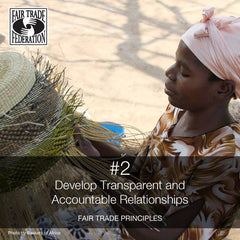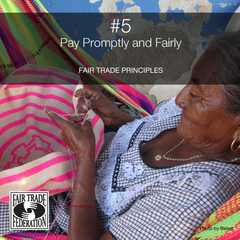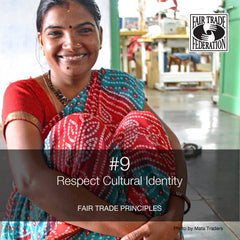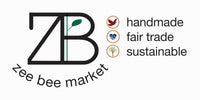Fair Trade
When we think of Fair Trade, we think of fair wages. And that’s a huge part of it. But Fair Trade does so much more to help elevate artisans in need. Here is a summary of its meaning and some of the ways Fair Trade practices go above and beyond to insure major impact for our artisan partners and their communities.

Fair Trade supports producers in developing countries who are socially and economically marginalized. These artisans and small scale farmers lack economic opportunities and often face many challenges in finding international markets for their goods.
Fair Trade is an approach to business and to development based on dialogue, transparency, and respect that seeks to create greater equity in the international trading system. It's not about charity, it's about providing tools so producers can gain sustainable employment. In the words of the Fair Trade Federation, it's Trade Built on Trust, 360° fair trade.
This chart shows the differences between the conventional supply chain and the Fair Trade supply chain model for coffee.

At the core of the fair trade model is a direct, cooperative, and in-depth relationship between buyers and sellers that keeps all of the principles of Fair Trade at the forefront. Fair Trade is about making a tremendous impact on artisan and farmer communities while offering great products to the public. Now you have a choice when making a purchasing decision: fair trade purchases improve communities, meet nutritional needs, cover health care costs. The poor, especially women, are empowered. The environmental impact of production, sourcing, and transport is mitigated to the fullest extent possible. Such an impact is created because Fair Trade approaches development as a holistic process.
![]()
These are the Nine Fair Trade Principles of the Fair Trade Federation that we are fully committed to:


Develop Transparent and Accountable Relationships. Fair Trade involves relationships that are open, fair, consistent, and respectful. Members show consideration for both customers and producers by sharing information about the entire trading chain through honest and proactive communication. They create mechanisms to help customers and producers feel actively involved in the trading chain. If problems arise, members work cooperatively with fair trade partners and other organizations to implement solutions.

Build Capacity. Fair Trade is a means to develop producers' independence. Members maintain long-term relationships based on solidarity, trust, and mutual respect, so that producers can improve their skills and their access to markets. Members help producers to build capacity through proactive communication, financial and technical assistance, market information, and dialogue. They seek to share lessons learned, to spread best practices, and to strengthen the connections between communities, including among producer groups.

Promote Fair Trade. Fair Trade encourages an understanding by all participants of their role in world trade. Members actively raise awareness about Fair Trade and the possibility of greater justice in the global economic system. They encourage customers and producers to ask questions about conventional and alternative supply chains and to make informed choices. Members demonstrate that trade can be a positive force for improving living standards, health, education, the distribution of power, and the environment in the communities with which they work.

Pay Promptly and Fairly. Fair Trade empowers producers to set prices within the framework of the true costs of labor time, materials, sustainable growth, and related factors. Members take steps to ensure that producers have the capacity to manage this process. Members comply with or exceed international, national, local, and, where applicable, Fair Trade Minimum standards for their employees and producers. Members seek to ensure that income is distributed equitably at all times, particularly equal pay for equal work by women and men. Members ensure prompt payment to all of their partners. Producers are offered access to interest-free advance payment for handmade goods, or pre-finance of agricultural harvest with favorable terms.

Support Safe & Empowering Working Conditions. Fair Trade means a safe and healthy working environment free of forced labor. Throughout the trading chain, Members cultivate workplaces that empower people to participate in the decisions that affect them. Members seek to eliminate discrimination based on race, caste, national origin, religion, disability, gender, sexual orientation, union membership, political affiliation, age, marital, or health status. Members support workplaces free from physical, sexual, psychological, or verbal harassment or abuse.

Ensure the Rights of Children. Fair Trade means that all children have the right to security, education, and play. Throughout the trading chain, Members respect and support the UN Convention on the Rights of the Child, as well as local laws and social norms. Members disclose the involvement of children in production. Members do not support child trafficking and exploitative child labor.

Cultivate Environmental Stewardship. Fair Trade seeks to offer current generations the ability to meet their needs without compromising the ability of future generations to meet their own needs. Members actively consider the implications of their decisions on the environment and promote the responsible stewardship of resources. Members reduce, reuse, reclaim, and recycle materials wherever possible. They encourage environmentally sustainable practices throughout the entire trading chain.

Respect Cultural Identity. Fair Trade celebrates the cultural diversity of communities, while seeking to create positive and equitable change. Members respect the development of products, practices, and organizational models based on indigenous traditions and techniques to sustain cultures and revitalize traditions. Members balance market needs with producers' cultural heritage.
Thursday, April 24, 2014

As the day began, I was reminded of the terrible collapse of a factory in Bangladesh a year ago. I wonder if much has changed. I'm not sure about you, but the many lives lost have inspired people around the world to rethink fashion and how the apparel industry operates in developing nations.
We shared this image today with our many customers and fans to show our commitment to Fair Trade and the producers whose lives are changing thanks to folks like you.
Thank you for joining us on this journey to create a more just marketplace. Live in North America? Find all Stores and Cafes near you that are members of the Fair Trade Federation.

